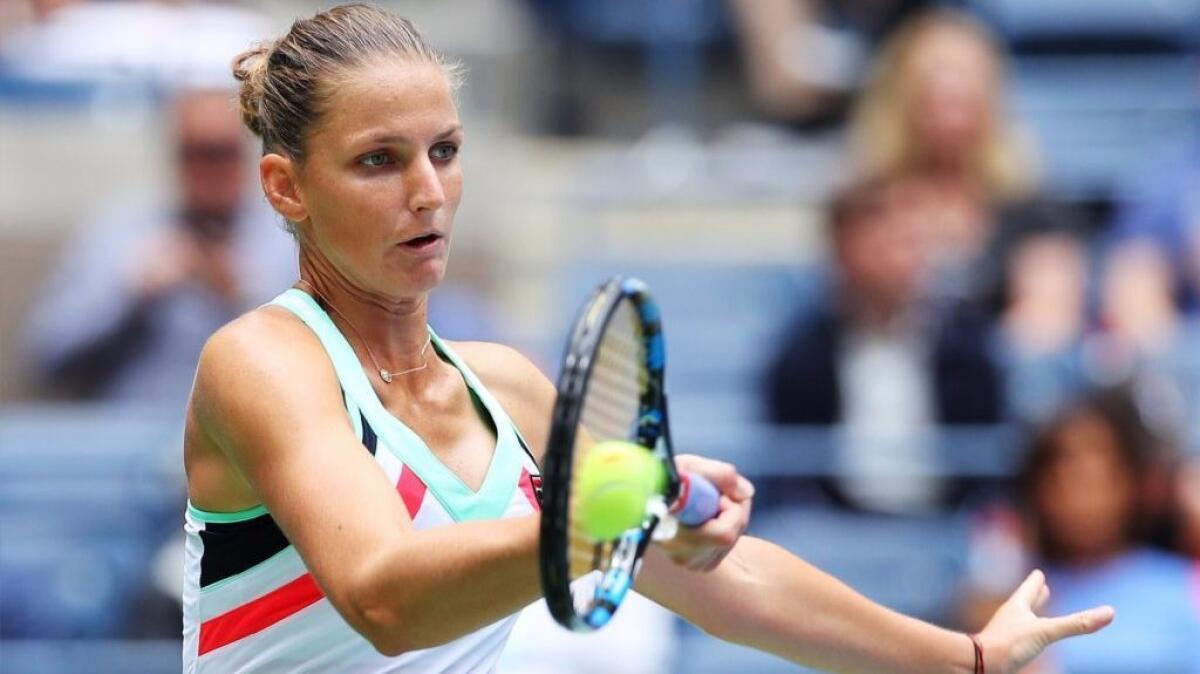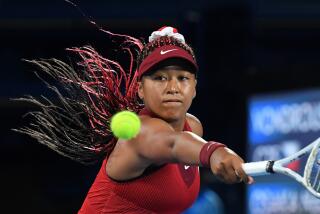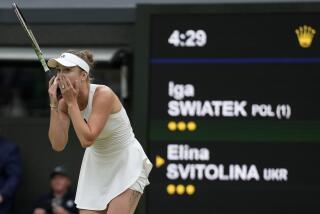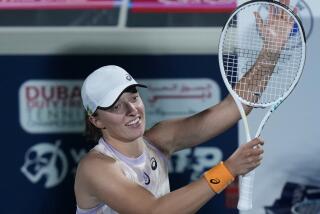Column: Karolina Pliskova is ranked No. 1, but she wants a title to go with it

As one of only 23 women who have been ranked No. 1 in the world since the Women’s Tennis Assn. adopted a computerized system in 1975, Karolina Pliskova of the Czech Republic is in exclusive company. She’s in another group she’d be happy to leave at the end of the U.S. Open: She’s among the few women who have ruled the rankings without winning a Grand Slam tournament before or after they reached the top.
Because of that, Pliskova — who has been No. 1 since July — is No. 1 with an asterisk.
Kim Clijsters and Amalie Mauresmo earned the top spot before they won a Slam but Clijsters went on to win four titles and Mauresmo won two. Jelena Jankovic, Dinara Safina, Caroline Wozniacki and Pliskova are the only women who have been No. 1 without subsequently winning a Grand Slam event, and only Pliskova still has a chance to change that in the final week.
Safina retired because of back problems in 2014, Jankovic was eliminated in the first round here, and Wozniacki was ousted in the second round. Pliskova on Saturday had to come back from losing the first set for the second straight match but she’s still going, propelled into the fourth round with a 3-6, 7-5, 6-4 victory over Zhang Shuai at Arthur Ashe Stadium.
The rankings system is based on points earned through performance. Those points come off each player’s total a year after the event, so the idea is to defend those points and keep them in your total. To remain No. 1 Pliskova must reach the final, or win the final if No. 3 Garbine Muguruza reaches the semifinals. If Muguruza reaches the finals, Pliskova can’t keep her spot. No. 4 Elina Svitolina also has a chance of becoming No. 1 depending on how Pliskova and Muguruza fare here.
The men’s rankings also are based on performance and points. Twenty-six men have held the top spot since 1973 but only Marcel Rios was No. 1 and never won a Grand Slam. (Ivan Lendl became No. 1 before winning eight Grand Slams). Current men’s No. 1 Rafael Nadal, who also had to make a comeback Saturday but advanced to the fourth round with a 6-7 (3), 6-1, 6-4 victory over Leonardo Mayer of Argentina, has won 15 Grand Slams, including two at the U.S. Open. No. 3 seed Roger Federer, who followed Nadal on the court at Ashe Stadium and defeated Feliciano Lopez of Spain 6-3, 6-3, 7-5, has won five of his 19 Grand Slams at the U.S. Open. “The atmosphere is fantastic. You guys are so special,” he told fans.
The women’s rankings have been affected by Serena Williams’ absence during her pregnancy. Williams, who gave birth to a daughter on Friday and has said she plans to return at the Australian Open, has spent 319 weeks as No. 1. Only Steffi Graff (377) and Martina Navratilova (332) have been No. 1 for longer.
The No. 1 ranking has more luster when it’s held by a player who has won a Grand Slam event, but Pliskova is simply playing by the existing rules. “I think it’s fair. It’s just like this. So if I don’t defend, I’m not going to stay No. 1,” said the Czech native, who was a runner-up here last year. “That’s how it is.”
Jennifer Brady, who will face Pliskova in the fourth round, believes Pliskova is a worthy No. 1. “She’s earned her place. You know, she’s been doing very well,” Brady said. “Just because she hasn’t won a slam, it’s not like she doesn’t deserve it or hasn’t earned it.”
Being No. 1 has its downside, primarily that rivals become inspired to save their best efforts for you. “I know all the opponents are behind me, so I should win every match, which is tough,” Pliskova said.
But to reach the top you’ve got to be cool under pressure, traits players down the rankings ladder might not have or develop. Pliskova faced a match point in the second set Saturday but suspected Zhang’s nerves might kick in. She was right. “I thought maybe she’s gonna help me,” Pliskova said, “and she actually did help me.”
Nadal said any stress he feels comes from within, not from an opponent. He had 13 break points before he converted one against Mayer on Saturday but when he did, he became calm and breezed the rest of the way. “The motivation that I have to do it well in an event that I love, that I played well in the past, and I always had a great connection with the crowd, that’s my pressure,” he said. “The rest of the things, I don’t think much about this.”
Until Pliskova wins a Grand Slam, the No. 1 ranking will have an invisible asterisk. “I’m not really fighting just for this position,” she said. “I just want to play well and I want to win.”
Follow Helene Elliott on Twitter @helenenothelen
More to Read
Go beyond the scoreboard
Get the latest on L.A.'s teams in the daily Sports Report newsletter.
You may occasionally receive promotional content from the Los Angeles Times.










